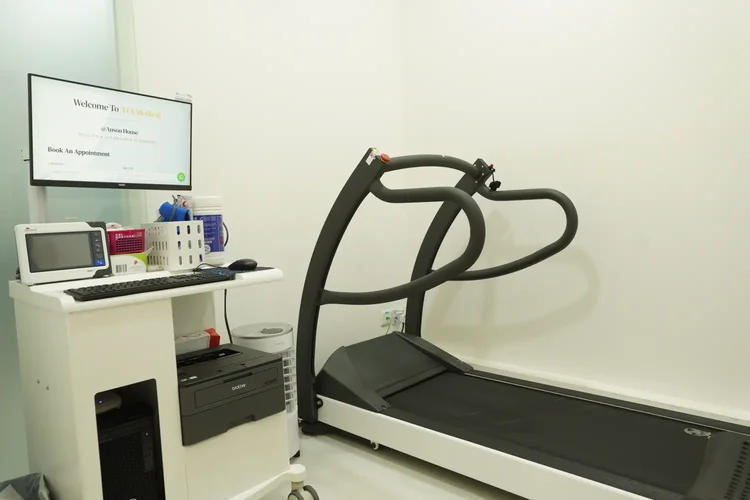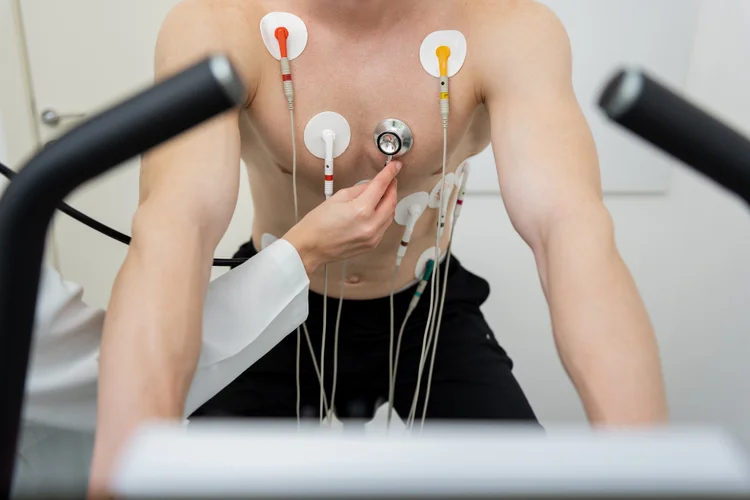Treadmill Stress Test
What Is a Treadmill Stress Test?
A treadmill stress test, or exercise stress test, is a diagnostic procedure that evaluates heart function during physical activity. By monitoring your heart under stress, the test can identify potential issues with blood flow, heart rhythm, and overall cardiovascular function. It also helps assess symptoms like chest pain, dizziness, or shortness of breath that may indicate underlying heart issues, providing critical insights for diagnosis and treatment.

How Does a Stress Treadmill Test Work?
The treadmill stress test evaluates your heart’s response to exercise, such as walking on a treadmill, by monitoring:
- Heart rhythm and electrical activity using an electrocardiogram (ECG)
- Heart rate
- Blood pressure
By simulating conditions where your heart works harder, the test helps identify potential abnormalities or symptoms that may require further evaluation or follow-up action.
Why Is a Treadmill Stress Test Done?
The treadmill stress test is a valuable tool for:
- Identifying Potential Coronary Artery Disease (CAD): Helps detect blockages or narrowing of the arteries supplying the heart by identifying reduced blood flow during exercise.
- Evaluating Exercise-Induced Symptoms: Assesses symptoms such as chest pain, shortness of breath, dizziness, or fatigue that may indicate underlying cardiac issues.
- Monitoring Treatment Effectiveness: Helps to evaluate effectiveness of current treatments for heart conditions such as medications or procedures.
- Assessing Fitness Levels: Guides recommendations for safe exercise and physical activity for individuals with existing heart conditions or those undergoing cardiac rehabilitation.
Treadmill Stress Test Stages
1. Preparation
Before starting the test, electrodes are attached to your chest to monitor your heart’s electrical activity via an ECG. A blood pressure cuff is placed on your arm to measure your blood pressure throughout the procedure.
2. Exercise Phase
You will begin exercising on a treadmill or stationary bike under medical supervision. The intensity of the activity gradually increases in stages to elevate your heart rate and simulate physical stress. During this phase, which typically lasts 10 to 15 minutes, your heart rate, rhythm, and blood pressure are closely monitored. The exact duration may vary depending on your fitness level, target heart rates, or the appearance of symptoms.

3. Cool-Down and Monitoring
After completing the exercise phase, you will enter a cool-down period where your activity level decreases. Your heart rate and other vitals will continue to be monitored until they return to baseline levels, ensuring your safety post-exercise.
Treadmill Stress Test Interpretation
After your treadmill stress test, your report will be interpreted by a cardiologist, and our doctor will review the results with you.
- Normal Results: Normal results indicate your heart is functioning well under stress, with appropriate responses in heart rate, rhythm, and blood pressure, and no significant symptoms like chest pain or shortness of breath. While reassuring, normal results do not entirely rule out early-stage heart conditions.
- Abnormal Results: Abnormal results may suggest reduced blood flow, irregular heart rhythms, or exercise-induced symptoms like chest pain or dizziness. These findings typically lead to further tests, such as a coronary angiogram or echocardiogram, to confirm and assess the condition.

Where Can I Do a Treadmill Stress Test in Singapore?
ATA Medical is conveniently located at 3 different locations:
- Tanjong Pagar Medical Clinic (Closest MRT: Tanjong Pagar EW15)
- Orchard Clinic (Closest MRT: Orchard Boulevard TE13)
- Jurong Clinic (Closest MRT: Jurong East NS1/EW24)
Treadmill Stress Test Price Singapore
At healthscreening.sg, we offer the treadmill stress test along with a range of heart health and stroke screening options. Additionally, you can consider our health screening packages, some of which include an optional treadmill stress test or other specialised heart assessments. The prices are as follows:
| Test | Price* |
|---|---|
| Treadmill Stress Test with ECG | $218 |
| Electrocardiogram | $49.05 |
| CT Coronary Angiogram (CTCA) | From $1,384.30 |
| CT Calcium Score | $403.30 |
|
Cardiac Screening 3 Essential Lipid Profile + Apolipoprotein B (ApoB) + HsCRP |
$63.22 |
|
Cardiac Screening 4 (Fasting Required) Cardiac Screening 3 + Homocysteine + Fasting Insulin + Glucose |
$172.22 |
| Health Screening Packages with Optional Treadmill Stress Test | |
| Royal | $667 |
| Jewel | $1415 |
| Marvel | $2289 |
*Prices are NETT and inclusive of GST.
^Prices last updated on
Jan 28, 2026. While every effort is made to keep pricing information up to date, please contact our team to confirm the latest rates.
How Do I Prepare & What to Wear for the Treadmill Stress Test?
- Have a light meal at least 2 hours before your appointment, unless instructed to fast.
- Avoid applying lotion, oil, or powder to your chest, as these can interfere with the adherence of ECG electrodes. Men are also advised to shave their chest to allow proper electrode placement.
- Wear comfortable, exercise-friendly clothing, such as a breathable top and flexible bottoms, along with suitable walking or jogging shoes. Bring additional essentials such as water and a towel.
- Remember to bring your identification card, memo, or referral letter (if applicable).
How Long Is the Treadmill Stress Test?
Most patients complete their treadmill stress test, including preparation and monitoring, within 30 to 60 minutes during off-peak hours. Please feel free to enquire with us about the best appointment times to minimise waiting. The results are typically ready within 72 hours, and the report will be emailed to you.
How Do I Book an Appointment?
Health Screening Clinics in Singapore
We offer comprehensive health screening services at two conveniently located clinics, both within
walking distance of Tanjong Pagar (EW13) and Orchard Boulevard (TE15) MRT stations.
Our clinics are equipped with advanced diagnostic technologies, including Chest X-ray, Ultrasound, and Bone Mass Density (BMD) scanners.
Additionally, our Orchard clinic is equipped with a CT (Computed
Tomography) scanner, enabling us to provide more detailed health assessments. Bookings can be
easily made via WhatsApp or by phone.
Why Choose Us?








Navigate Easy With Google Maps
Health Screening Singapore (Anson House)
Nearest MRT: EW15 Tanjong PagarHealth Screening Singapore (Camden Medical Centre)
Nearest MRT: TE13 Orchard BoulevardHealth Screening Singapore (CPF Jurong Building)
Nearest MRT: NS1/EW24 Jurong EastFrequently Asked Questions (FAQ)
Completing six minutes may indicate sufficient cardiovascular fitness for some individuals, depending on age, overall health, and conditioning. However, the optimal duration varies, as the test evaluates how your heart responds to increasing stress. Shorter durations could result from symptoms or reaching your target heart rate quickly, which does not necessarily indicate poor fitness. It is best to discuss and clarify your results with your doctor.
A normal stress test range includes reaching a target heart rate (typically 85% of your predicted maximum, based on age), a normal blood pressure response, and no significant ECG changes or symptoms like chest pain. These results suggest good heart function under stress, but it is best to review them with your doctor for a thorough understanding.
During a treadmill stress test, electrodes are attached to your chest to monitor your heart’s electrical activity using an electrocardiogram (ECG). You will walk on a treadmill or pedal a stationary bike, with the intensity gradually increasing. Throughout the test, your heart rate, rhythm, blood pressure, and any symptoms are closely monitored to assess heart function and identify potential issues.
A stress test cannot directly visualise blockages in coronary arteries. However, it may indicate reduced blood flow to the heart (e.g., ST-segment depression on ECG), prompting further imaging tests like a coronary angiogram to confirm blockages.
Most individuals spend about 10 to 15 minutes in active exercise during the test, though this duration depends on factors such as age, fitness level, and how quickly target heart rates are reached. The total session, including preparation and monitoring, typically lasts 30 to 60 minutes.
A MET (Metabolic Equivalent of Task) score of 10 or higher generally indicates excellent fitness. The expected MET level decreases with age, and age-adjusted norms should be used for interpretation. It is best to discuss your results with your doctor for a more thorough understanding and personalised evaluation.
Concerning stress test results include significant ST-segment depression or elevation on the ECG, abnormal blood pressure responses, arrhythmias, or irregular heart rhythms. Symptoms such as chest pain, dizziness, or shortness of breath during the test may also indicate an issue. These findings usually require further diagnostic evaluation.
A healthy stress score, such as +5 or higher on the Duke Treadmill Score, indicates a low risk of coronary artery disease. This score is based on factors like exercise duration, ECG changes, and symptoms during the test. It is best to review your results with your doctor for a comprehensive interpretation.
The target heart rate during a treadmill stress test is typically 85% of your maximum heart rate, calculated as 220 minus your age. For example, a 40-year-old would aim for around 153 beats per minute. This target helps ensure the heart is sufficiently stressed to provide meaningful test results.
Failing a treadmill stress test indicates abnormal findings, such as reduced blood flow, arrhythmias, or symptoms like chest pain during the test. It is important to review your results with your doctor, who may recommend further evaluations, such as a coronary angiogram or echocardiogram, to determine the underlying cause.
A normal ECG during a stress test is reassuring but does not rule out all heart conditions. Early-stage disease or small blockages may not cause noticeable ECG changes, so additional tests could still be required. It is best to review your results with your doctor for a more comprehensive understanding.
Drinking excess water before the test may cause discomfort during exercise and potentially affect blood pressure readings. It is important to follow your doctor’s hydration advice, as small sips of water may be allowed.
A stress test is considered positive if it reveals abnormal findings. These may include significant ECG changes, such as ST-segment depression, exercise-induced symptoms like chest pain or shortness of breath, or abnormal blood pressure responses during the test. A positive result typically indicates the need for further diagnostic evaluation to determine the underlying cause.
Yes, even with a normal stress test, heart problems can still exist, particularly in the early stages or with small blockages that may not produce noticeable changes during the test. It is important to discuss your results with your doctor to determine if follow-up tests are needed.
Wear comfortable, exercise-friendly clothing, such as a breathable top and flexible bottoms. Choose suitable walking or jogging shoes and bring essentials like a towel and water.
